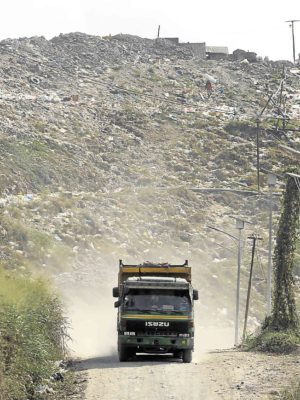DENR: Reopening Payatas not an option
Despite appeals to keep it open, the Payatas sanitary landfill in Quezon City is now permanently closed, according to officials of the Department of Environment and Natural Resources (DENR).
On Monday, DENR officials, representatives of IPM Environmental Services — the company manning the landfill — and local government officials started discussing the city’s detailed Safe Closure and Rehabilitation Plan (SCRP) for the shuttered facility.
Mansueto Bolivar, chief of DENR’s Solid Waste Management Division, said that reopening Payatas was no longer feasible.
DENR senior management specialist Mario Bang-loi, the lead case handler of the landfill, said the garbage generated by Quezon City residents would now be redirected to the landfill in Rodriguez, Rizal.
Based on the SCRP, IPM Environmental Services will work with the Quezon City government in implementing effective post-closure care, particularly leachate management and slope stability re-profiling of the landfill, for 15 years based on Republic Act 9003.
Article continues after this advertisementRehab plan for landfill
IPM is also expected to comply with the following: refrain from dumping solid waste in the landfill, institute rehabilitation of the facility, submit the detailed SCRP and abide by the existing rules and regulations of existing environmental laws. These steps were detailed in a recent letter sent by DENR-National Capital Region director Vizminda Osorio to IPM president Isabelita Mercado.
Article continues after this advertisement“The people have been appealing, especially the pickers, hawkers, operators and the smalltime garbage collectors [to keep the landfill open]. It’s hard not to feel pity for them. It’s like you are depriving them of work and food. But you have to prioritize their safety,” Bolivar said, recalling the department’s dialogue with scavengers and junkyard workers last Wednesday.
Bang-loi, on the other hand, said that the Quezon City government was now focusing on ways to manage garbage such as requiring residents to practice proper segregation.
According to Bolivar, there were earlier proposals to consider Navotas as the destination for garbage collected from nearby areas in Quezon City such as Balintawak and Muñoz.
“But after 10 years, the Rodriguez landfill may be full again. What happens next? Do we stick to sanitary landfills or do we modernize our landfill system just like in other countries? Unfortunately, the government has no solid plans on this,” Bang-loi noted.
The city government had announced plans to permanently close the Payatas landfill by the end of last month because it was nearing its capacity limit.
According to Aldrin Cuña, city administrator, the landfill receives at least 2,800 tons of garbage every day from 142 barangays. These are hauled by at least 200 trucks. Despite unsanitary and unsafe conditions, communities thrive around the dump where many people work as scavengers or in junk and recycling shops.
In 2000, a “trashslide” at the landfill buried and killed over 200 people.
